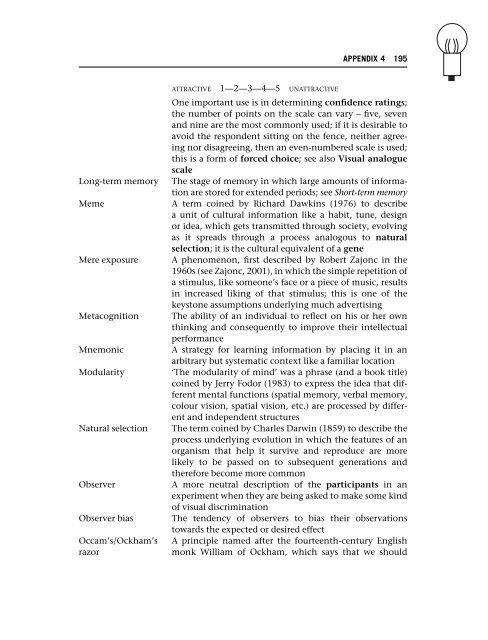Psychology - Forgot your username
Psychology - Forgot your username
Psychology - Forgot your username
You also want an ePaper? Increase the reach of your titles
YUMPU automatically turns print PDFs into web optimized ePapers that Google loves.
ATTRACTIVE 1—2—3—4—5 UNATTRACTIVE<br />
APPENDIX 4 195<br />
One important use is in determining confidence ratings;<br />
the number of points on the scale can vary – five, seven<br />
and nine are the most commonly used; if it is desirable to<br />
avoid the respondent sitting on the fence, neither agreeing<br />
nor disagreeing, then an even-numbered scale is used;<br />
this is a form of forced choice; see also Visual analogue<br />
scale<br />
Long-term memory The stage of memory in which large amounts of information<br />
are stored for extended periods; see Short-term memory<br />
Meme<br />
A term coined by Richard Dawkins (1976) to describe<br />
a unit of cultural information like a habit, tune, design<br />
or idea, which gets transmitted through society, evolving<br />
as it spreads through a process analogous to natural<br />
selection; it is the cultural equivalent of a gene<br />
Mere exposure A phenomenon, first described by Robert Zajonc in the<br />
1960s (see Zajonc, 2001), in which the simple repetition of<br />
a stimulus, like someone’s face or a piece of music, results<br />
in increased liking of that stimulus; this is one of the<br />
keystone assumptions underlying much advertising<br />
Metacognition The ability of an individual to reflect on his or her own<br />
thinking and consequently to improve their intellectual<br />
performance<br />
Mnemonic<br />
A strategy for learning information by placing it in an<br />
arbitrary but systematic context like a familiar location<br />
Modularity<br />
‘The modularity of mind’ was a phrase (and a book title)<br />
coined by Jerry Fodor (1983) to express the idea that different<br />
mental functions (spatial memory, verbal memory,<br />
colour vision, spatial vision, etc.) are processed by different<br />
and independent structures<br />
Natural selection The term coined by Charles Darwin (1859) to describe the<br />
process underlying evolution in which the features of an<br />
organism that help it survive and reproduce are more<br />
likely to be passed on to subsequent generations and<br />
therefore become more common<br />
Observer<br />
A more neutral description of the participants in an<br />
experiment when they are being asked to make some kind<br />
of visual discrimination<br />
Observer bias The tendency of observers to bias their observations<br />
towards the expected or desired effect<br />
Occam’s/Ockham’s A principle named after the fourteenth-century English<br />
razor monk William of Ockham, which says that we should






